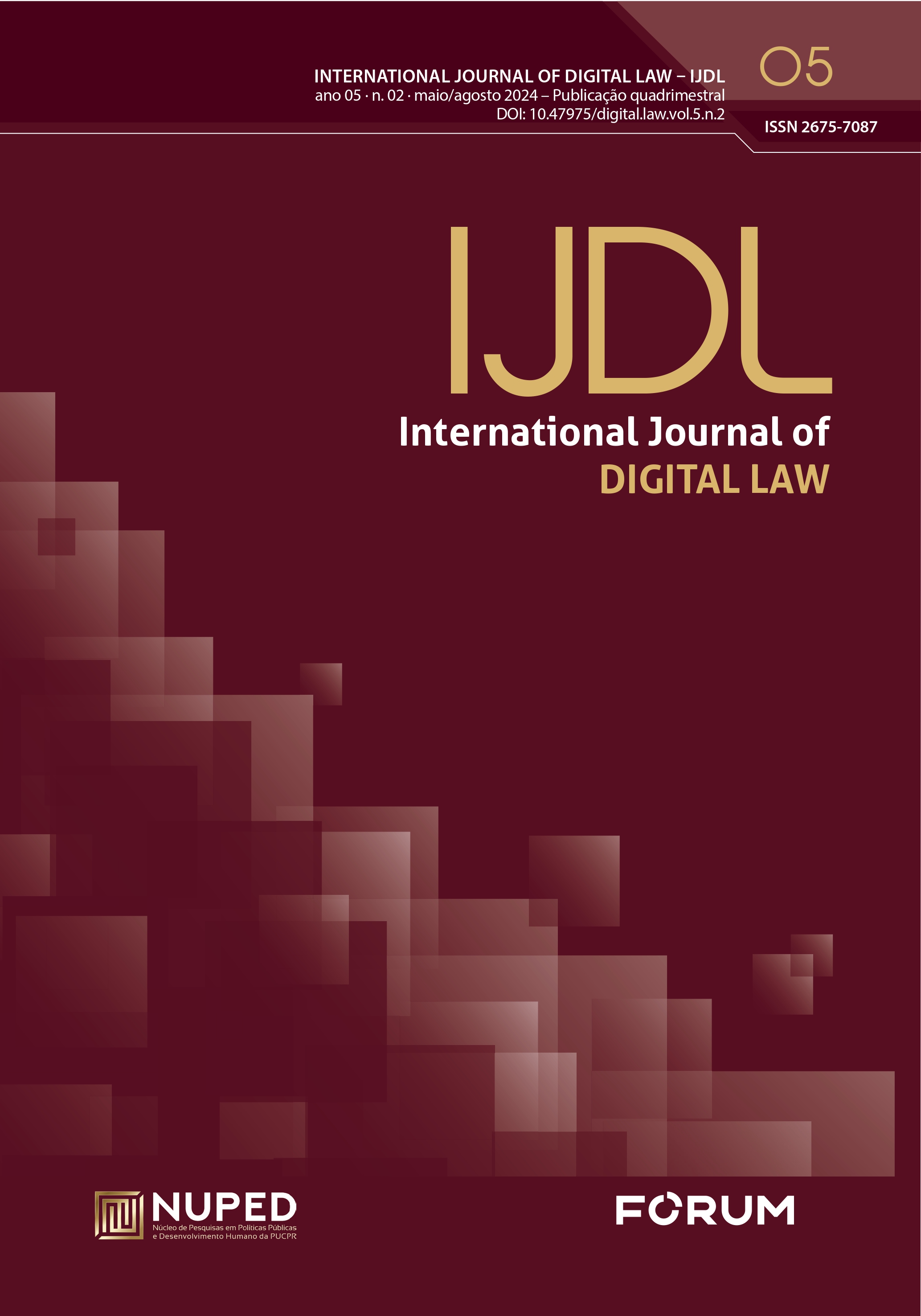Public security and artificial intelligence: new paradigms
DOI:
https://doi.org/10.47975/digital.law.vol.5.n.2.lealKeywords:
Public security; Public policies; Fundamental rights; Rule of law; Control of public policiesAbstract
The object of study of this work is to confront the problem of the conditions and possibilities
of public security policies with the use of artificial intelligence and information technologies, taking
into account fundamental individual and social rights and guarantees demarcated by the Democratic
Rule of Law, namely in Brazil. The hypothesis and proposal for tackling these issues is based on the
establishment of clear normative frameworks and guarantee policies by the State, from which such
policies can be instituted and developed, with permanent internal and external control, notably social.
Downloads
References
BAMFORD, James. The shadow factory: the ultra-secrets NSA from 9/11 to the eavesdropping on America. In Democracy Now, em 14/10/2008. Disponível em: <https://www.democracynow.org/2008/10/14/james_bamford_the_shadow_factory_the>. Acesso em: 29 abr. 2024.
CASTELS, Manuel. La Sociedad en Red - La era de la información. Economía, sociedad y cultura. Vol.1. Madrid: Alianza Editorial, 1997.
CERI, Paolo. La Società Vulnerabile – Quale sicurezza, quale libertà. Roma/Bari: Laterza, 2003.
COLE, David. Enemy Aliens – double standards and constitutional freedoms in the war on terrorism. New York: The New Press, 2003.
D’AGOSTINI, Franca e FERRERA, Maurizio. Le verità del potere – Sei diritto aleatici. Roma: Einaudi, 2019.
DOMINICI, Piero. La società dell’irresponsabilità. Milano: Franco Angeli, 2015.
FELICE, Emanuele. Dubai – L’ultima utopia. Roma: Il Mulino, 2020.
FERRAJOLI, Luigi. La democrazia attraverso i diritti. Roma: Laterza, 2013.
FOUCAULT, Michel. Vigilar y castigar. Nacimiento de la prisión. México: Siglo XXI, 1983.
GRECO, Rogério. Direitos humanos, sistema prisional e alternativas à privação de liberdade. São Paulo: Saraiva, 2011.
HARARI, Yuval Noah. Homo Deus. Uma breve história do amanhã. São Paulo: Companhia das Letras, 2016.
KUKSO, Federico. Una historia de control. In El Atlas de la revolución digital – del sueño libertario al capitalismo de vigilancia. Buenos Aires: Capital Intelectual, 2019.
LEAL, Rogerio Gesta. Segurança Pública no Estado Democrático de Direito – avanços e recuos. São Paulo: Tirant lo Blanch, 2023.
LEAL, Rogerio Gesta e SILVA, Ricardo Machado da. O Direito Fundamental Social à Segurança Pública no Estado Democrático de Direito – parâmetros para políticas públicas de implementação. Cruz Alta: Ilustração, 2023.
MCNEALY, Scott. Private Lives? Not ours! Disponível em: <https://www.pcworld.com/article/16331/private_lives_not_ours.html>. Acesso em: 23 mai. 2022.
MONGARDINI, Carlo. Le dimensioni sociali della paura. Milano: Franco Angeli, 2010.
MOROZOV, Evgeny. The net delusion: the dark side of internet freedom. New York: Public Affairs, 2019.
RODRIGUEZ, Miguel Angel Davarra. De las autopistas de la información a la sociedad virtual. Madri: Aranzadi Editorial, 2008.
SAISSE, Renan. Big data contra o crime: efeito Minority Report. In Revista Digital Direito & TI, [s. l.], 7 set. 2017. DOI: https://doi.org/10.63451/ti.v1i8.79
SAUER, Moritz. Weblogs, Podcasting & Online-journalism. Cambridge: O’Reilly Verlag GmbH & Co., 2017.
TOFFLER, Alvim. La tercera ola. México. Edivisión, 1981.
VAROUFAKIS, Yanis. Technofeudalism. London: Bodley Head, 2023.
VATTIMO, Gianni. La società transparente. Roma: Garzanti, 2000.
VERHOEVEN, Charles Leben. Le principe de précaution – aspects de droit international et communautaire. Paris: Éditons Panthéon-Assas, 2022.
WALZER, Michael. La libertà e i suoi nemici nell’età della guerra al terrorismo. Roma/Bari: Laterza, 2010.
ZOLO, Danilo. Sula paura – fragilità, aggressività, potere. Milano: Feltrinelli Editore, 2011.
ZUBOFF, Shoshana. The age of surveillance capitalism. New York: Perseus Books, 2019.
Downloads
Published
How to Cite
License
Copyright (c) 2024 Rogério Gesta Leal (Autor)

This work is licensed under a Creative Commons Attribution 4.0 International License.
This journal is licensed by
Creative Commons Attribution-NonCommercial-4.0 International.
Attribution-ShareAlike 4.0 International (CC BY-NC 4.0)
Submission and publication of paper are free; Works evaluated by blind double review; the Journal uses S_cites and CrossCheck (anti-plagiarism); and complies with the COPE Editors Guide - Committee on Publication Ethics, in addition to the Elsevier and SciELO recommendations.
















